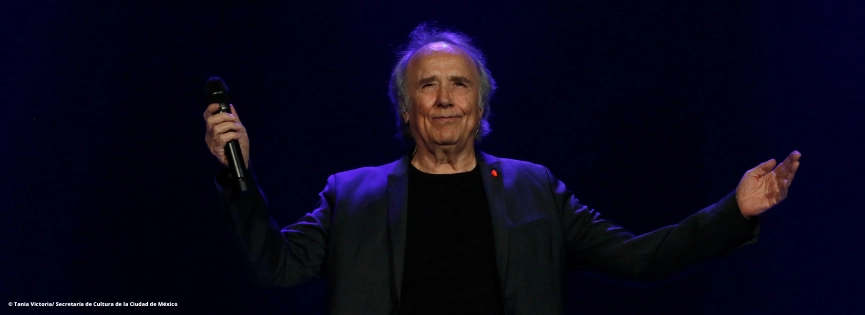Main content
Joan Manuel Serrat 2024 Princess of Asturias Award for the Arts

Joan Manuel Serrat was born on 27th December 1943 in Barcelona. A graduate in Agricultural Engineering, during his university years he began to come into increasing contact with the world of music. In 1964 he recorded his first album, Una guitarra, and, after being part of the group Els Setze Jutges, he made his debut as a performer in 1965. A year later he starred in his first solo recital at the Palau de la Música in Barcelona, coinciding with the beginning of the golden age of the Catalan nova cançó, an artistic movement that promoted music sung in Catalan with a spirit of protest during Franco’s dictatorship.
Serrat is one of the leading figures of modern song. His songs form part of the emotional memory of several generations in Spain and Ibero-America, both in Catalan and Spanish, two languages that he has fostered and helped to advance from a natural balance as vehicles of harmony and understanding, far from any confrontation. He has set music to poems by Antonio Machado, Miguel Hernández, Rafael Alberti, Federico García Lorca, Luis Cernuda, Pablo Neruda, Mario Benedetti and Eduardo Galeano, among others. These poets have influenced his own musical creation, which is also marked by other genres, such as Catalan folklore, Spanish copla, tango, bolero and the popular songbook of Ibero-America. In 1966, he published Ara que tinc vint anys and Cançó de matinada, with which he reached the top of the charts in Spain. In 1968, he was chosen to represent Spain in Eurovision, but he stood down because he could not sing in Catalan, and in 1975 he had to go into exile for criticizing Franco’s regime. Some of his albums, such as Mediterráneo, En tránsito, Cada loco con su tema, Utopia, Banda sonido d’un temps, d’un País and Mi niñez are considered singer-songwriter classics. In 2003, he presented Serrat sinfónico, a selection of his most emblematic songs and, after a hiatus for health reasons, he reappeared in 2005 with the show Serrat 100 x 100. In 2007, he began his first tour with Joaquín Sabina, Dos pájaros de un tiro, which they would repeat on two more occasions over the years, and in 2010 they published Hijo de la luz y de la sombra, a second tribute to poet Miguel Hernández. In 2014, he published the compilation Antología desordenada, with which he commemorated his fifty years on stage and embarked on a tour in 2015 comprising more than one hundred concerts. This was followed by the El Gusto es Nuestro 20 Años tour of Spain and Ibero-America, a version of the one he had previously done in 1996 with Víctor Manuel, Ana Belén and Miguel Ríos. In April 2022, he began his last tour in New York, El vicio de cantar, with which he announced that he was retiring from the stage and which took him to dozens of cities in Spain and Ibero-America; a tour that closed with three final concerts in December 2022 at the Palau Sant Jordi in Barcelona.
Serrat’s career has also been highlighted for his commitment to and defence of democracy and human rights. In 1978, he unreservedly supported the Spanish Constitution and, in the seventies and eighties, became a symbol in many Ibero-American countries, not only for his artistic quality, but also for his commitment against dictatorships and military dictatorial regimes. In recent years, he has been very critical of the direction taken by the Catalan independence movement and harshly criticized the call for the referendum on 1st October 2017.
Holder of honorary degrees from several Spanish and Ibero-American universities, in addition to being decorated in Spain, Serrat has received distinctions in Venezuela, Argentina, France, Colombia, Chile, Ecuador, Uruguay, Peru and Mexico. Holder of the Gold Medar of Merit in Fine Arts (1994) and Merit at Work (2006) from Spain, he has been recognized with the insignia of the Order of the Aztec Eagle of Mexico (2010) and the Grand Cross of the Civil Order of Alfonso X, the Wise by the Government of Spain (2022). Among other distinctions, he has received the National Award for Contemporary Music (2010), the Latin Grammy for Person of the Year (2014) and the Odeón de Honor Award (Spain, 2022). In 2023, he was named Adopted Son of Orihuela and received the Atocha Lawyers Award for his defence of human rights.
End of main content
